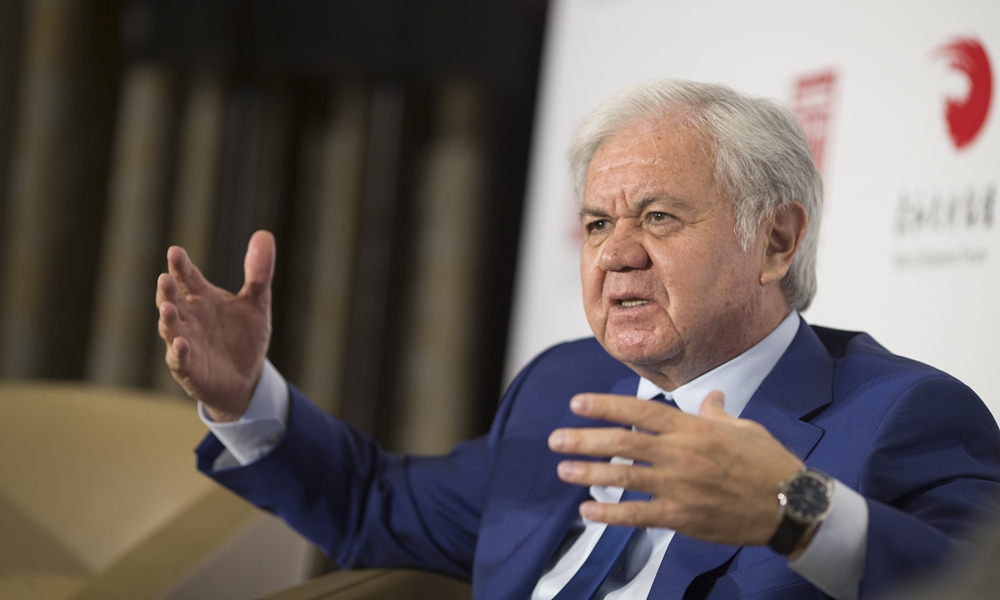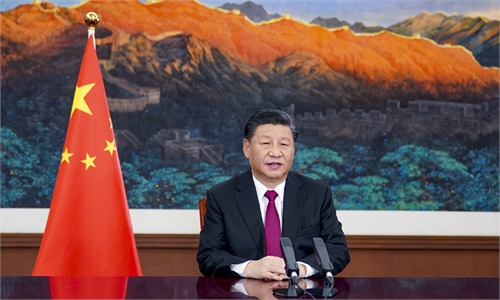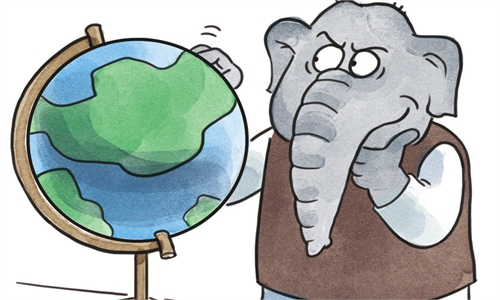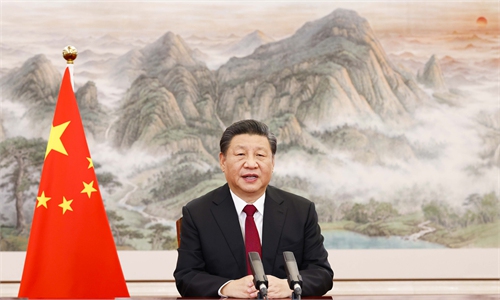China-Russia coordination fosters security, stability and prosperity in Central Asia

Rashid Alimov Photo: Li Hao/GT
Editor's Note:
On Tuesday, Chinese President Xi Jinping will chair a virtual summit commemorating the 30th anniversary of the establishment of diplomatic relations between China and five Central Asian countries. Despite dire predictions 30 years ago that Central Asian countries may gradually lose traction in the global arena, the region has developed rapidly through cooperation with two firm friends and partners, China and Russia. Rashid Alimov (Alimov), a distinguished fellow at the Taihe Institute and former secretary-general of the Shanghai Cooperation Organisation (SCO), shared his views on China-Central Asia ties, as well as China and SCO's future roles in the region, in an interview with Global Times (GT) reporters Li Aixin, Bai Yunyi and Xia Wenxin.
GT: This year marks the 30th anniversary of the establishment of diplomatic ties between China and the five countries of Central Asia. How would you comment on the development and the relations between the two sides in the past three decades?
Alimov: First of all, this is an important event for China and the five Central Asian countries. China was among the first countries to recognize the independence and sovereignty of the Central Asian states. Right from the beginning, their relations were based on respect for the principles of sovereign equality and territorial integrity, non-interference in each other's internal affairs, and the prohibition of any activities contrary to these principles.
Through the mutual efforts of China and these five countries, historic border issues were resolved in the shortest time possible. As a result, good-neighborliness, friendly ties, and multifaceted, mutually beneficial cooperation in various fields have been established. Thanks to joint efforts, the relations between these countries have achieved unprecedented growth and reached the level of comprehensive strategic partnership over the past three decades.
Second, geographical proximity and good-neighborliness have stimulated the successful development of comprehensive multifaceted cooperation, including trade and economic cooperation. Starting from zero, China and the Central Asian countries have demonstrated a high level of inter-attraction. After resolving the issues about transport interconnectivity, bilateral trade between China and each of these countries has rapidly increased.
According to data from China's customs service, the country's trade volume with the five Central Asian countries equalled $1.5 billion in 2001, and in the 20 years since then, it increased by more than 24 times. This is an impressive number, considering that China's trade with all countries in the world grew eight times during the same period.
Turkmenistan saw the biggest increase in trade with China between 2001 and 2020 - from $32.7 million in 2001 to $6.5 billion in 2020, an increase of 199 percent. Over the same 20 years, the trade turnover between Uzbekistan and China has grown by more than 100 times, from $58.3 million in 2001 to $6.6 billion in 2020. Tajikistan has a similar figure: It saw an increase from $10.7 million in 2001 to $1.06 billion in 2020. The trade turnover of Kyrgyzstan and China has grown by more than 23 times from $118.9 million in 2001 to $2.9 billion in 2020, and Kazakhstan saw an increase of 15 times - from $1.3 billion in 2001 to $21.4 billion in 2020. China is also becoming an important destination for Central Asian exports.
Third, China has become one of the key sources of direct investment in Central Asian economies, the total amount of which approached $40 billion by the end of 2020. In Kazakhstan, it reached $21.4 billion; in Kyrgyzstan, $4.6 billion; in Uzbekistan, over $10 billion; in Tajikistan, over $3 billion.
The investment growth is directly related to Chinese companies that are successfully operating in the region, be they in the form of joint ventures or wholly owned Chinese enterprise. The number of these companies reached 7,700 at the end of 2021. For example, 2,705 Chinese enterprises and 798 joint ventures are registered in Kazakhstan. In Uzbekistan, the number (of Chinese enterprises) is close to 2,000, an increase of 0.5 times since 2017. It is important that Chinese capital comes to Central Asia countries along with new technologies and the best solutions in agriculture and water management, industry, and mechanical engineering. They help accelerate the transition to new industrial rails in Central Asian countries so that they can jointly build a digital and "green" economy.
Fourth, the Belt and Road Initiative (BRI) launched in Central Asia in 2013 has promoted the implementation of major infrastructure projects, especially in the field of transport interconnectivity. Thanks to the BRI, landlocked countries in Central Asia now have alternative routes to engage in maritime trade. Central Asian countries now play the important role of a land-based intercontinental bridge between Asia and Europe.
The Kazakhstan section of "Western Europe-Western China," a transnational infrastructure project and transport corridor, has been fully commissioned. For the first time in history, bilateral road transport of goods can be realized "from door to door." Checkpoints on the borders of China with Kyrgyzstan and Tajikistan are now open all year round.
Thus, the tremendous joint work between China and the Central Asian countries over 30 years has created a future for foreign trade that is mutually beneficial and meets the fundamental interests of these countries. In other words, a new era has begun in the relations between the Central Asian countries and China.

Photo: VCG
GT: How do you see Chinese and Russian roles developing in Central Asia? And what roles will the Collective Security Treaty Organization (CSTO) and the Shanghai Cooperation Organisation (SCO) play in regional affairs?
Alimov: I'm quite optimistic. First of all, we should bear in mind the great historical legacy, the significance, and the weight of relations between Russia and Central Asian countries. Thanks to Russia, an effective security system has been created in the center of Eurasia. This system is capable of effectively repelling external aggression. This was shown by the actions of the CSTO during the recent events in Kazakhstan.
On the other hand, relations between China and the region have their roots in the distant past. They have been developing dynamically over the past two decades without any "irritants," and therefore without any restrictions. China's development and its achievements provide an excellent opportunity for the sustainable development of the Central Asian countries.
I would also like to remind you that at the dawn of the 21st century, it was under the initiative of China and Russia that the SCO was created. The core of the organization was and still is Central Asia. In other words, the two great powers have demonstrated how to form sustainable dialogue and cooperation in Central Asia. They have established large-scale coordination that is in the interests of security, stability, progress, and prosperity in Central Asia. This is supported by the BRI, the revival of the Great Silk Road, and the further development of the SCO.
Objectively, it is Russia and China that remain the key external forces supporting the integration processes within Eurasia. The two countries act as a type of bridge between Asia and Europe, and Central Asia will play an increasingly important role in this.
And what role will the CSTO and SCO play in regional affairs? An extremely positive one. For example, the 20-year-old SCO has entered a new era of its development. We are not talking about the formation of a military-political alliance. Nor are we talking about an economic integration union with the formation of supranational governance institutions. No, of course not. However, we will witness the intensive development of political dialogue and the promotion of effective interaction between participants in the SCO. Moreover, more attention will be paid to increasing the role of the SCO in further strengthening the stability and socio-economic development of Central Asia.
The same can be said about the CSTO, which plays an important role in strengthening the system of collective security in Central Asia. The CSTO is a vivid example of broad multilateral cooperation in the field of security against the backdrop of growing global terrorism and extremism. This context can be proven by the new situation in Afghanistan and the possible negative impact for Asia.
Afghanistan's neighbors will be in a state of concern for a long time. Effective counteraction to the escalated threats requires coordinated action by all parties concerned. As we know, the SCO and the CSTO were the first to respond to the new situation in Afghanistan. On September 16, 2021, leaders of these two organizations held a summit to discuss in detail a joint response to the Afghanistan issue. The contact between the two organizations continues through their secretaries-general and anti-terrorist structures.
GT: Would you like to talk about the recent turbulence in Kazakhstan? Do you think it can be viewed as a black swan event? Are you surprised?
Alimov: The tragic events came as a surprise to many, and I was no exception.
GT: Will what happened in Kazakhstan affect geopolitics in Central Asia? Some people say that the US, Russia and China are engaged in fierce geopolitical competition in Central Asia; what is your take on this view? Do you think it is possible for Central Asian countries to witness an "Arab Spring" on their soil?
Alimov: Central Asia needs a big lift, not a new "Great Power Game." Russia and China are close neighbors, loyal friends, and reliable strategic partners for Central Asian countries. They are among the top three trading partners and investors in the region. This says a lot. As for the "Arab Spring," we know what that leads to: a lingering winter, civilian casualties, and economic decline. Central Asia does not need such turmoil.
GT: The reasons behind the turbulence are complicated. Yet the role of Western interference can hardly be ignored. Observers note there is a large number of US-funded NGOs in Kazakhstan. Why do you think the US needs that many NGOs in the country?
Alimov: It is up to each country to determine whether it needs NGOs funded by foreign governments. The investigation will show what role NGOs played in the recent events in Kazakhstan. As we know, the US and the EU have adopted new strategies for their activities in Central Asia. An important part of these strategies is the so-called movement to establish democracy and an open economy. This process, in the view of the West, is slow in the region.
Each country has its own path of political, economic, social, and cultural development, taking into account the historical experience and national characteristics of each state. The West should respect a country's choice, rather than impose its vision of how the country should develop based on its own ideas about democracy. The example of Afghanistan is a tragic example. However, as we know, only those who are willing to learn can learn the lessons of history.
GT: The Chinese side has stated firm support for Kazakhstan to end the chaos. In your opinion, what role can China play in stabilizing the situation in Kazakhstan?
Alimov: First, China has clearly demonstrated its strong support for the actions of the Kazakhstani leadership from the very beginning. This has great significance at a critical moment. The leaders of China and Kazakhstan have been in constant contact, and this has certainly provided invaluable moral support to both Kazakh President Kassym-Jomart Tokayev and the people of Kazakhstan.
During the crisis, China demonstrated that it is a loyal friend and reliable partner by opposing external interference in Kazakhstan's internal affairs. In other words, China has already provided Kazakhstan with strong support. The development of such support can be expected in all areas, including increased cooperation with Kazakhstan's law enforcement and security agencies, humanitarian assistance, and support for Kazakhstan in the SCO and the UN.
GT: With the Beijing Olympics approaching, some politicians in Western countries are calling for a diplomatic boycott against the Games. What is your comment on the boycott?
Alimov: The Olympics can promote peace and cooperation. Sport should not be a tool for politics. It is already clear that those who attempt to politicize the Beijing Winter Olympic Games will not achieve their goals. Some officials from some countries will not attend the ceremonies of the upcoming Games, but this will not spoil the world's celebration of sport at all. If someone is trying to stop China's development by taking this shameful step, they will not succeed. As a Russian saying goes, "the train has left the station."
The 2022 Winter Olympics in Beijing has once again confirmed China's impressive achievements in all areas, including sport. It is also worth recalling that Beijing is the first city in the history of the Olympics to host both the summer and winter Olympic Games. The Olympics will certainly be an inspiring event for millions of Chinese as well as for the world. I am sure that hundreds of thousands of young people in Asia will discover winter sports thanks to the Games in Beijing.
By the way, all the leaders of Central Asia, will come to China. There is no doubt that the Beijing Winter Olympic and Paralympic Games will make an invaluable contribution to strengthening friendship, mutual understanding and harmony among people.



